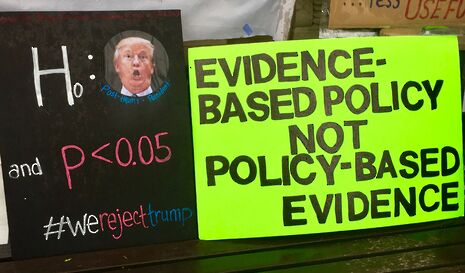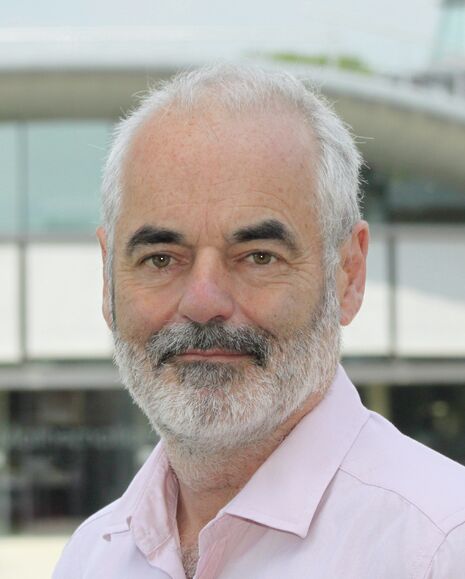Dodgy data: understanding risk in a post-truth world
In conversation with David Spiegelhalter, Winton Professor for the Public Understanding of Risk in the Cambridge Statistical Laboratory.

It seems like there isn’t a day that goes by without the tabloid press releasing an article proclaiming that one lifestyle choice or another leads to cancer, Alzheimer’s, or diabetes. Only some of these risks, however, are real. I spoke to David Spiegelhalter, Winton Professor for the Public Understanding of Risk in the Cambridge Statistical Laboratory, to discuss how we can better understand this beguilingly simple topic.
Spiegelhalter suggests that in order to understand the “dodgy data, naughty numbers, shabby statistics” that litter headlines, we must look at their process of generation. “It’s a complex chain that comes from scientific studies. Those tend to be selectively published, and then they are selectively given a press release, often exaggerating the findings. And then it’s picked up by a journalist, and often the journalist runs quite a good story, but then the sub-editor sticks a ghastly, really manipulative headline, because they’re going for clicks.”
“Risk applies to everything we do in our daily lives and the lives of society”
David Spiegelhalter
Risk, explains Spiegelhalter, means the fact that “good or bad things might happen and you don’t know what they’re going to be …. I regard this as anything to do with: you don’t know what’s going to happen. Which is everything! Risk applies to everything we do in our daily lives and the lives of society, the lives of the world.” For such a central concept to the human condition, risk is extremely poorly understood: “We know from psychological studies that people find this extremely difficult because there’s so much of an emotional engagement to threats.” Due to these emotional responses, risk can be seen as a dual concept - “risk as feeling and risk as analysis” - which Spiegelhalter likens to Daniel Kahneman’s idea of thinking fast, thinking slow. We need to move from the former to the latter to analyse risk more efficiently.
Key to this transition is conceptualising the magnitude of risk because every decision has an associated risk - “nothing is safe”. “There’s nothing that irritates me more than reading a headline saying that ’Talcum powder increases the risk of breast cancer,’ ’Bacon increases the risk of bowel cancer’, the last one I saw was ’going to university increases the risk of a brain tumour’ from the Daily Mirror, which I think is a classic of its time. I love it, I use it all the time.”
“Bacon is carcinogenic. Start the day with a carcinogen I say.”
David Spiegelhalter
Spiegelhalter gives an example of this, alluding to a report that suggests that “if you have a bacon sandwich a day, it increases your risk of getting bowel cancer by 18%.” This, he explains, is called relative risk - “it doesn’t say from what to what” - which is “a highly emotionally manipulative way of communicating risk.” Interpretation is impossible, Spiegelhalter explains, unless you know the baseline risk. About 6 in 100 people will end up getting bowel cancer anyway, meaning “an 18% increase over 6 in 100: it’s 7 in 100.” Knowing this, you “can turn the whole story around and tell it in a different way - that 100 people have to eat a great, big, greasy, three rasher bacon sandwich every single day of their lives and one of them will get bowel cancer because of it. And you tell it like that and people say: “oh is that all? Well, pass the brown sauce! Do I care?” My reaction to that is that I’m not going to stop eating bacon … but bacon is carcinogenic. Start the day with a carcinogen I say, but don’t do too much of it.”

Coupled with this notion of magnitude is the distinction between hazard and risk. “Risky is to do with the actual, practical importance, the magnitude of something. The hazard is the fact that it could potentially be dangerous. Flying in an aeroplane, six miles up in a tin can, is highly hazardous: there’s an enormous number of horrible things that can happen. But it’s not risky, because so many precautions are in place.”
It is evident that humans are naturally very bad at evaluating risk, yet in an age of “two important movements - data science and fake news” it has never been so crucial to understand this concept. “The education system needs to adjust” suggests Spiegelhalter, promoting “data literacy, … [which] is of fundamental importance to be a citizen today. If you’re not data literate, you are illiterate in the sense of not understanding what’s going on.” This is very distinct from maths: “Maths as you learn it in school … is really highly abstract ideas: how to do geometry, trigonometry and everything else, applied in very simple circumstances. And many people find it very difficult indeed. What I’m talking about is actually very simple ideas being applied in quite complex, realistic situations, where you have to take apart an argument … Critiquing a story about a bacon sandwich is not really mathematical.”
“Some people’s opinions are worth a lot more than other people’s opinions.”
David Spiegelhalter
Governance in recent years has been driving increasingly towards so-called “evidence-based policy,” yet with this comes several associated challenges. Spiegelhalter objects to the terminology, saying it “makes it sound too much as though it is mechanical: you collect the evidence and it tells you what to do, and therefore that’s what should be done. That would be both untrue and undemocratic. In the end, people largely have to make decisions on our behalf and we should be able to vote them out if we don’t like what they’re doing.” He is instead in favour of “evidence-informed policy.” On the other hand, rejection of the experts is an equally harmful outlook: “if they don’t take [evidence] into account, then I think they should be accountable for that.” Spiegelhalter also notes that we must ask “Who are the experts? Where does this evidence come from? Whose evidence?” Many contentious areas - climate change, fracking, GM foods, vaccines, e-cigarettes - have many experts “that will tell you all sorts of things, many of which will be contradictory. So it’s difficult to resolve those.” We must thus evaluate each expert’s advice: “Not every bit of evidence is as good as everybody else’s. In other words, some people’s opinions are worth a lot more than other people’s opinions. It’s not an evidence free-for-all out there.”
Impartial assessments of the quality of evidence, suggests Spiegelhalter, are key to this final dilemma, and he feels like the NHS is the template example that other fields, such as “education, policing, energy provision,” should follow. “Health has really got itself quite sorted, in terms of accumulating evidence, weighing it up, looking at the harms and benefits. I think it’s an extraordinary achievement - the envy of the whole world - but it’s taken decades of work.” One key area Spiegelhalter feels lacks this impartial assessment is nuclear waste disposal, which he feels is an “absolutely absurd attention to microscopic, I would say almost non-existent, risks. Everyone’s obsessed with the dangers of nuclear waste disposal. Spending billions of pounds on it, where that money could save so many lives if it were better used.”
Given that risk pervades every decision we make, and indeed the decisions made in the houses of power, it is striking to see that risk is so poorly understood, that we think fast, being immersed in our initial emotional response, rather than thinking slow, impartially analysing risk. This dual nature of risk conceptualisation is an inherent, unavoidable facet of our psychology, and as a consequence, we must acknowledge our emotional responses and temper them with cooler analysis. This is just as important in our day to day lives as it is in governance
 News / Right-wing billionaire Peter Thiel gives ‘antichrist’ lecture in Cambridge6 February 2026
News / Right-wing billionaire Peter Thiel gives ‘antichrist’ lecture in Cambridge6 February 2026 News / Cambridge students uncover possible execution pit9 February 2026
News / Cambridge students uncover possible execution pit9 February 2026 News / Man pleads guility to arson at Catz8 February 2026
News / Man pleads guility to arson at Catz8 February 2026 News / Epstein contacted Cambridge academics about research funding6 February 2026
News / Epstein contacted Cambridge academics about research funding6 February 2026 News / John’s duped into £10m overspend6 February 2026
News / John’s duped into £10m overspend6 February 2026









